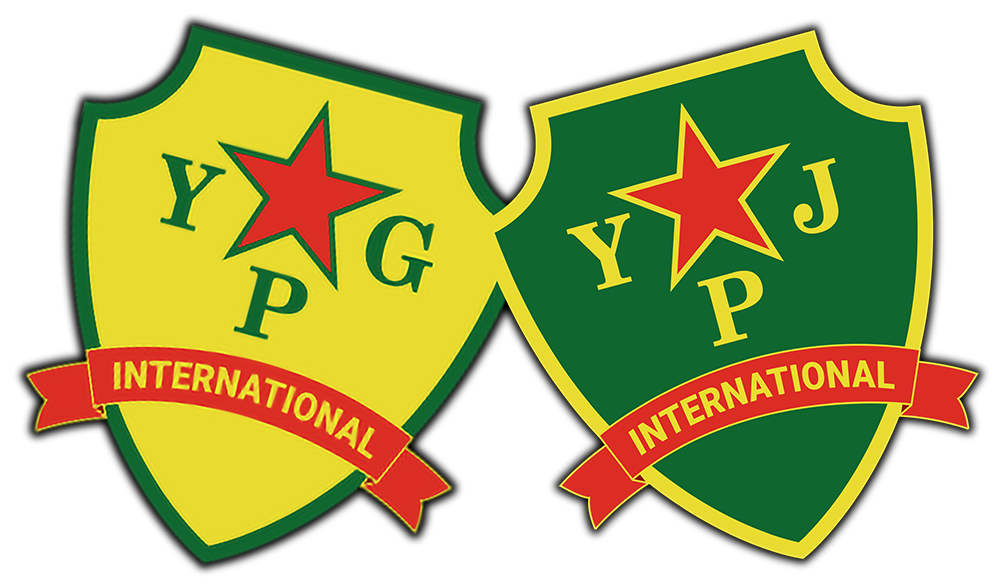Ş. Bagok Serhat – Ş. Kendal Breizh – Ş. Baran Sason – Ş. Rustem Cudî – Ş. Şahîn Huseynî – Ş. Baran Galicia
We remember our Şehîds of February
Bagok Serhed – Ashley Johnston
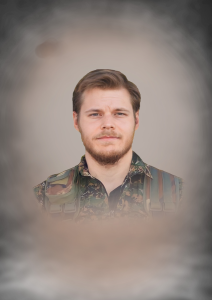 Date and Place of Birth: 15 April 1986 – Maryborough, Australia
Date and Place of Birth: 15 April 1986 – Maryborough, Australia
Date and Place of Martyrdom: 21 February 2015 – Gundê Xesan, Til Hemis, Heseke
Heval Bagok came to Rojava late 2014 with the Lions of Rojava, an early internationalist unit of the YPG. Before arriving he was a postal worker and an Army Reservist with the Australian Army. He spent seven years with the Australian Army Reserves, where he served as a rifleman and combat medic, military experience that would prove valuable. Like many he was enraged by the worldwide terrorist attacks of ISIS as well as their brutal oppression of the people of Syria. Deciding that he could not sit by and let these crimes continue, he resolved to travel to Syria to support the YPG.
After Heval Bagok’s mother Amanda learned of his martyrdom she had made a mission to discover more of the revolutionary struggle of the Kurds, eventually coming to say: “I am part Kurd” in solidarity with not only her son, but all who fight for freedom. And although nothing will bring her son back, Amanda says that knowing he is not forgotten by the Kurds is part of her own healing process. “I look at the photographs and… you can see his eyes are shining and his face is all lit up. He wanted to be there. He didn’t want to die, but you can see in his face that he’s really happy with himself and happy with what he’s doing. I’m proud of him.”
YPG fighter Ashley Johnston, Şehîd Bagok was martyred during the operation to liberate Til Hemis on 23 February 2015. He was laid to rest in Canberra, the capital city of Australia, on 8 April.
Kendal Breizh – Olivier Le Clainche
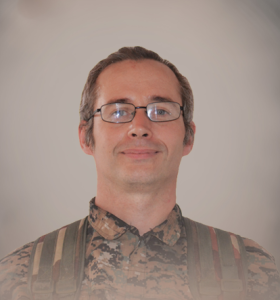 Date and Place of Birth: 26 October 1977 – Malestroit, Bretagne
Date and Place of Birth: 26 October 1977 – Malestroit, Bretagne
Date and Place of Martyrdom: 10 February 2018 – Afrîn
Olivier Le Clainche was born in 1977 in Britanny, a peninsula in the West of the French state where many of the Breton people live. A Celtic language, Breton is spoken there. The French nation-state, in asserting its idea of French identity over the peoples in its territory, forbade the speaking of Breton in schools, with children being punished for speaking their language. For many years, a movement for greater autonomy in the region has existed, with some groups fighting a militant campaign against the French state.
Olivier had strong connections with this movement, but he firmly rejected the narrow ethno-nationalism of many streams of the Breton nationalist movement. As a founding member of the group Huch! and with the Coordination Bretagne Indépendante et Libertaire (Coordination for an Independent and Libertarian Brittany), he published many writings in the journal “le Huchoèr”, articulating a perspective which rejected the bourgeois and assimilationist French state as well as the nation-state model in general.
Olivier was very conscious of the freedom struggles against occupation in other lands, and wrote of the struggles in Ireland and the Basque Country among others. He rejected the view, found within parts of the anarchist movement, that dismissed the national liberation struggles on the European continent. His work also centered on supporting those who faced state repression for their militant actions, opposing the violence of police and military institutions, the courts and the prisons.
“It should be constantly recalled that independence is not freedom…It is the end of an oppression, by the severing of the hierarchical and colonial link, but it maintains a people under the domination of an indigenous state. But independence without the establishment of a really liberating social project for the people, but also for each of the individuals who compose it, does nothing: who would be stupid enough to believe that a Breton boss, by the mere fact of being Breton, will be better than a French boss? To believe that a Breton cop, will be less oppressive than a French cop? To believe that a Breton baton will be softer than a French baton? To think, in fact, that the creation of a Breton state is the solution to all the evils of Brittany? To think of the independence of Brittany…as an end in itself is to lure, and it is to lure the individuals for whom we try to fight, starting with ourselves. It is to place yourself in a situation of being enslaved by a new power, by a new state.”
With this clear ideological perspective, it is no surprise that he found common cause with the Kurdish Freedom Movement and the revolution in Rojava, which attempts to build a movement for the liberation of oppressed peoples outside of the nation-state paradigm.
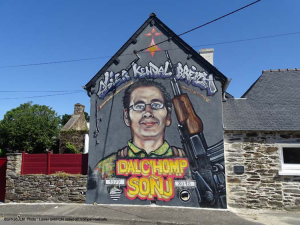 Joining the Rojava Revolution in the summer of 2017, Olivier sought to defend the revolution and the people of the region from the barbaric attacks of jihadists and fascist states. In Rojava, he was elected by the friends at the Internationalist Academy as the person responsible for security, a position he took with great enthusiasm and dedication. “He took his duties so seriously it was almost a parody,” his comrade recalls. “I mean, the man literally slept on the guard tower instead of a room with air conditioning. […] To him, this was a position he had been selected for by his comrades, and he was not going to let them down. This was a sacred thing for him, and he wasn’t going to risk breaking the trust his friends put in him. Not even for a second.” “There were soldiers who came with 10 years of special forces experience, and we didn’t give them a rifle with a firing pin [in the Academy],” remembers his commander in YPG International. “But we gave it to him. Heval Kendal was an exemplary revolutionary, humble and very intelligent,” he says.
Joining the Rojava Revolution in the summer of 2017, Olivier sought to defend the revolution and the people of the region from the barbaric attacks of jihadists and fascist states. In Rojava, he was elected by the friends at the Internationalist Academy as the person responsible for security, a position he took with great enthusiasm and dedication. “He took his duties so seriously it was almost a parody,” his comrade recalls. “I mean, the man literally slept on the guard tower instead of a room with air conditioning. […] To him, this was a position he had been selected for by his comrades, and he was not going to let them down. This was a sacred thing for him, and he wasn’t going to risk breaking the trust his friends put in him. Not even for a second.” “There were soldiers who came with 10 years of special forces experience, and we didn’t give them a rifle with a firing pin [in the Academy],” remembers his commander in YPG International. “But we gave it to him. Heval Kendal was an exemplary revolutionary, humble and very intelligent,” he says.
In Rojava he was given the name Kendal, and in the end settled on the second name Breizh, in honour of his homeland. He served at the front line in the campaigns in Raqqa and Deir-Ez-Zour. When the invasion of Afrîn began, he was determined to be part of the resistance. “I went around to everyone to ask them one by one if they wanted to go to Afrîn,” remembers the YPG International commander. “He said to me ‘If you don’t send me to Afrîn, I will go to Afrîn.’
Şehîd Kendal was martyred in Afrîn on 10 February 2018 in clashes with the Turkish mercenary gangs. He was martyred alongside Şehîd Baran. 600 people attended the ceremony in Lorient, Brittany in memory of Şehîd Kendal and other revolutionaries who were martyred by the aggression of the fascist Turkish state. “Kendal was, and is, a true comrade. He was kind, thoughtful, outgoing, and made the revolution his PERSONALLY. He wasn’t just going to fight the revolution. He was going to live it. He was going to BE it. He was going to eat, sleep, and breathe the revolution. Even in our darkest times, Kendal had a level of hope and spirit I’ve never seen in any other human. Kendal, I will miss you forever. My heart is breaking a million times over. There is nobody in my life who I have lost after loving as much as I love you, and I will likely not feel this kind of heartbreak again. Without you, the world is truly a darker place,” said his comrade in memorial.
To this day, the YPG International tabûr is named in his honor.
Rustem Cudi – Gunter Helsten
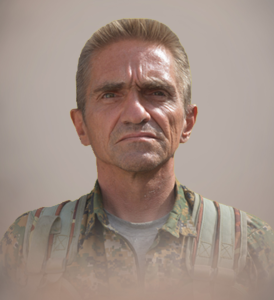 Date and Place of Birth: 8 November 1969 – Germany
Date and Place of Birth: 8 November 1969 – Germany
Date and Place of Martyrdom: 23 February 2016 – Şaddadî
In many ways, Şehîd Rustem’s arrival in Rojava tells us much about his spirit. With the help of local supporters of the movement in Bakur, he came by crawling under a fence on the heavily militarized border between Turkey and Syria into a no-man’s land between the two state lines. Upon crossing this fence he found himself immediately moving through a minefield. A lifelong soldier, Rustem used his skills and knowledge to cross safely and methodically through the minefield. From the Rojava side he saw two hevals waving at him. First thinking that they were a welcoming party, he soon realised that they were warning him of the two Turkish military vehicles pursuing him. He decided to sprint the final distance through the minefield, making it to safety. He commented “either I ran and risked hitting a mine or I got shot by the Turkish army, but these are the choices of a soldier.”
Şehîd Rustem had known no other trade than soldiering in his many years before coming to Rojava. Over the decades of his career as a soldier, he served in the German Army, the French Foreign Legion and as a private military contractor. At one point in his career he had an epiphany – though he knew how to fight, he did not know why he fought. In the revolution in Rojava and the war against the fascist advances of Daesh, Şehîd Rustem found his reason.
“It is easy to pull the trigger, but to know why you do this is the most important.”
Already advanced in years when he arrived in Rojava, Şehîd Rustem often took on the role of a tough but benevolent father figure and teacher for the younger fighters in his unit. He had a deep admiration for the process of collective self-criticism, known as tekmîl, that is practiced within the Kurdish Freedom Movement, and participated in it enthusiastically to help himself and his comrades to develop. “All the time you must criticise” he would say, “this is how people learn.”
Rustem Cudi is remembered by his comrades as a deeply loving individual with a warm and generous spirit. After the warm welcome he received in Kobanê, he felt a deep attachment to the Kurdish people. Although he had travelled to many far-flung places in the world during his life as a mercenary, now whenever someone asked him where he came from, he would smile and say “Kobanê”.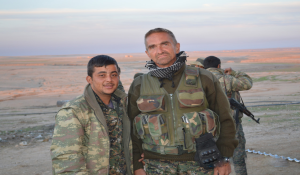
It was in Rojava that Şehîd Rustem first came across leftist ideas, but he was deeply impressed by the ideals and practices of the revolution. He carefully studied the works of Abdullah Ocalan alongside revolutionaries from the Kurdish movement, and found here a new reason to fight.
Şehîd Rustem was martyred on the frontline in Şaddadî 23 February 2016 at the age of 47, by a Daesh attack while assisting a wounded comrade. His life and memory is celebrated by all those who knew him.
Şahîn Huseyni – Haukur Hilmarsson
Date and Place of Birth: 22 July 1986 – Iceland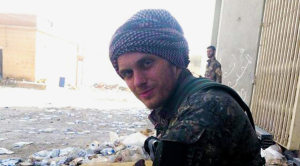
Date and Place of Martyrdom: 24 February 2018 – Afrîn
“When Haukur was a child, he was very obedient to his parents and teachers, but he always defended people who he felt had been treated unjustly,” remembers his mother Eva Hauksdóttir in an interview with an Icelandic journalist. “As he grew older, he became more rebellious towards authorities; questioning the law and the police, and I was a bit surprised because he’d always been such a good child. When I asked him about this he said it’s very different being under the authority of someone who cares for you, or if you’re under the command of some impersonal state or system with no personal connection to you. I think most of what Haukur has been doing since he was a teenager can be seen in light of this distinction he made between personal authority and the state or some other impersonal authority.”
As a youth, he was already at the forefront of many social and political struggles in Iceland. At just 17, he was organised with the environmental defense organisation Saving Iceland.
“Haukur was truly a lamplighter, of many people and struggles in Iceland and abroad,” one comrades remembers. He was usually amongst the first – the first to join the environmental protest movement in Iceland, the first to visit and organise with refugees, the first to take direct action against deportation, there at the founding of the IWW in Iceland, the first to go to Rojava.”
With his lifelong values of justice and equality, his courageous approach and his constant struggle for a free life, it is no surprise that Haukur found himself drawn to the revolution in Rojava. From Greece, where he had lived for some time, he came to join the resistance against the fascist forces which sought to crush the movement for freedom. He joined RUIS (Revolutionary Union for International Solidarity), a Greek militant anarchist group which formed part of the International Freedom Battalion. His first attempt to cross into Syria from Iraq ended in disaster as he was arrested and deported back to Iceland. In typical fashion for Haukur, he was undaunted by this setback and immediately returned, successfully crossing into Rojava in the summer of 2017.
In Rojava, he took on the nom-de-guerre Şahîn. After training with the Ş. Serkan Tabur of MLKP, he joined in the fight for the liberation of Raqqa. Heval Şahîn saw heavy fighting in the centre of Raqqa alongside the IFB. He took to military work well, becoming a capable fighter and organizer, and was quickly made a team commander in the IFB.
“Victory over fascism is in the interest of us all. In the interest of everyone, it is, after all, in the interest of all humanity.”
When the invasion of Afrîn came, like many times before, he was among the first to volunteer to go to the front. On 24 February 2018 Heval Şahîn was engaged in heavy clashes around the village of Badina, in which the resistance fighters successfully held off the advance of the jihadist gangs of the Turkish state. Heval Şahîn was martyred when a Turkish air strike hit the village, killing several comrades.
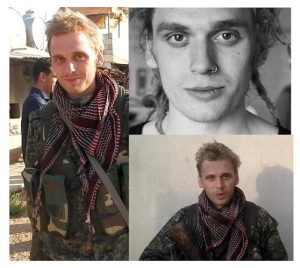 His comrades in RUIS said this in remembrance: “Haukur’s paradigm guides revolutionaries and scares the fascists. We, his comrades, continue marching his and our path, the one for revolutionary internationalist solidarity. We defend life, freedom and the land itself from mercenaries, fascists, and state’s oppression. Haukur’s revolutionary standing is motivating every freedom fighter to keep resisting and every proletarian in world to enforce and defend this revolution. To us – his comrades – he is still alive! He lives in our resistance against fascism and tyranny, empowering us to continue the struggle for social liberation!”
His comrades in RUIS said this in remembrance: “Haukur’s paradigm guides revolutionaries and scares the fascists. We, his comrades, continue marching his and our path, the one for revolutionary internationalist solidarity. We defend life, freedom and the land itself from mercenaries, fascists, and state’s oppression. Haukur’s revolutionary standing is motivating every freedom fighter to keep resisting and every proletarian in world to enforce and defend this revolution. To us – his comrades – he is still alive! He lives in our resistance against fascism and tyranny, empowering us to continue the struggle for social liberation!”
Like Şehîd Hêlîn Qereçox, the body of Şehîd Şahîn has yet to be recovered from the battlefield, despite pressure from family, friends and comrades. The Turkish state often withholds the bodies of SDF fighters and guerrillas in order to cause further misery to their families. The Turkish occupation forces have refused to allow anyone to enter the battlefield to search for the body of Şehîd Şahîn. On 17 June 2018, Haukur’s brother Darri scaled the roof of government offices in Iceland and hung a Turkish flag there, to draw attention to the government’s failure to act to recover his body.
Baran Sason – Sjoerd Heeger
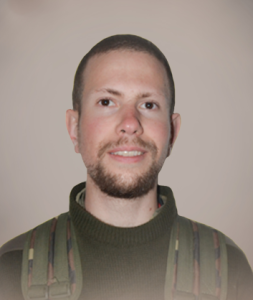 Date and Place of Birth: 12 November 1993 – Helmond, Netherlands
Date and Place of Birth: 12 November 1993 – Helmond, Netherlands
Date and Place of Martyrdom: 12 February 2018 – Deir ez-Zor
Sjoerd Heeger was born in 1993 in Helmond, Netherlands and grew up in Eindhoven. Before coming to Rojava, he had worked in a call centre and as a sanitation worker. Before coming to Syria, he spent a few months fighting with the far-right Right Sector militia in the Donbass region of Ukraine. Although the values of this militia completely oppose the ideas of the YPG and the Rojava Revolution, he commented to a journalist that “That war [Ukraine] is about power, this is about freedom.”
He first came to Rojava in late 2016, where he took on the name nom-de-guerre Baran (Rain) Sason. After completing his training in early 2017, he fought in Operation Wrath of Euphrates, the liberation of Raqqa from Daesh. After this he also traveled to Afrîn to defend against the turkish fascist invasion, before returning to the front in Deir Ez-Zor.
Heval Baran was a capable fighter who was always eager to place himself at the forefront of the fighting. Most of those who fought with him were not aware of his history with Right Sector.
While fighting on the front line in Deir-ez-Zor, Şehîd Baran Sanson was martyred on 12 February 2018 in a VBIED attack by Daesh.
Baran Galicia – Samuel Prada Leon
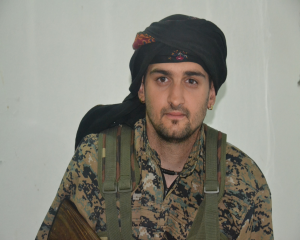 Date and Place of Birth: 6 September 1993 – Ourense, Galicia
Date and Place of Birth: 6 September 1993 – Ourense, Galicia
Date and Place of Martyrdom: 10 February 2018 – Afrîn
Samuel Prada Leon was born in Ourense, Spain in 1993. Heval Baran came to Rojava in the summer of 2017. In Kurdistan he took the Kurdish nom-de-guerre “Baran Galicia” Baran meaning “rain” and Galicia after the region of Spain. Before coming to Rojava, he served with the internationalist unit of the Sinjar Resistance Units (Yekîneyên Berxwedana Şengalê: YBŞ). He was educated as a sniper. Heval Baran saw heavy fighting on the frontline. He was there when the caliphate’s capital at Raqqa fell to the SDF, and he saw combat against Daesh at the front in the deserts of Deir-Ez-Zour. When Turkey invaded, there was no doubt in his mind that he would join the historic resistance in Afrîn.
He came to Rojava without any military experience. But the great love he had for his fellow human beings and for nature made him a warrior parexcellence. He was one of those who liberated Raqqa, the so-called capital of all that is evil. He then went to Shengal to protect and help the people there. But when he heard about Afrîn, his decision to defend it was as solid and noble as his love for human beings and for nature. Before he departed for Afrîn he said ‘I will defend innocent people and the olive trees of Afrîn. The innocence of children here is the same as in my country. The beauty of the olive trees is the same as in Galicia’. He fought courageously so that the children of Afrîn would freely and peacefully live under the shadow of their olive trees. We are proud to be his comrades. We promise him that we and the people of Afrîn will avenge him and will protect the honor of love and liberated life.” Şehîd Baran was martyred alongside Şehîd Kendal on February 10, 2018 while defending Afrîn from the aggression of the fascist Turkish state and their jihadist gangs. His life was celebrated at a Şehîd ceremony in Derik which was attended by hundreds of mourners and comrades.
